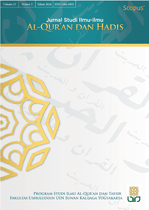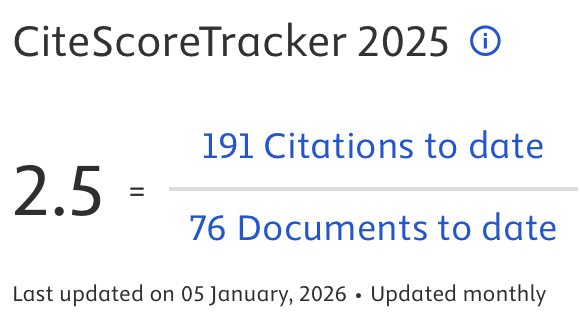The Development of Qur’anic Thematic Exegesis in Indonesia: Historical Landscape and Shifts of Authority
DOI:
https://doi.org/10.14421/qh.v25i2.5422Keywords:
Contemporary Indonesia Exegesis; Development of Exegesis; Qur’anic Studies; Thematic Exegesis.Abstract
Recognizing that thematic Qur'anic interpretation has become the most prominent method in the modern era, this study aims to track its evolution in Indonesia. Despite its popularity in academic contexts, there remains a critical gap in examining its application outside of universities. This study focuses on the shifts in interpretative authority and methodology in thematic Qur'anic exegesis across different sectors, including the state, Islamic boarding schools, universities, and individuals. Using a critical analysis method, the study uncovers several key findings. Firstly, there has been an authoritative shift, where Qur'anic commentators in Indonesia are not limited to traditional mufassir but now include scholars from non-religious fields. Secondly, methodological shifts are evident in several aspects: the editorial framing of interpretations, the reduction in the selection of Qur'anic verses used as primary research data, and the emergence of distinct interpretative tendencies. Additionally, there has been a paradigm shift in the relationship between Qur'anic text and social reality, where one approach begins with the Qur'an and leads to an idealistic-normative interpretation, while another starts from social reality and results in an applicative-solutive interpretation. This research fills a crucial academic gap by highlighting the broader changes in thematic exegesis, offering insights into its evolving methodologies and its relevance in addressing contemporary social realities in Indonesia.
 Abstract viewed: 1334 times
|
Abstract viewed: 1334 times
|
 PDF downloaded = 993 times
PDF downloaded = 993 times
References
Amin, Ahmad Syaifuddin. “Mengokohkan Otoritas Mufassir Melalui Uṣūl Al-Tafsīr (Review Kitab ‘Ilm Al-Tafsīr: Uṣūluhū Wa Manāhijuhū Karya Muhammad Afifuddin Dimyati).” Diya Al-Afkar: Jurnal Studi Al-Quran dan Al-Hadis 9, No. 02 (February 4, 2022).
———. “Studi Kata Kallā dalam Al-Qur’an (Penerapan Metode Tafsir Tematik terhadap Jenis Kata Ḥurūf).” Master Thesis, Uin Syarif Hidayatullah, 2022.
Arifin, Zaenal. “Karakteristik Tafsir Al-Mishbah.” Al-Ifkar: Jurnal Pengembangan Ilmu Keislaman 13, No. 01 (March 31, 2020): 4–34.
Asif, Muhammad. “Tafsir dan Tradisi Pesantren.” Suhuf 9, No. 2 (2016): 241–64. Https://Doi.Org/10.22548/Shf.V9i2.154.
Asvia, Erma Sauva. “Telaah Epistemologi Penafsiran Agus Mustofa (Studi Ayat-Ayat Akhirat dalam Tafsir Ilmi).” Sunan Kalijaga State Islamic University Yogyakarta, 2018.
Azizy, Jauhar, Mohammad Anwar Syarifuddin, And Hani Hilyati Ubaidah. “Thematic Presentations in Indonesian Qur’anic Commentaries.” Religions 13, No. 2 (2022): 140.
Azizy, Jauhar, Dasrizal, Sihabussalam, “Konsistensi Penerapan Metode Maudhu’i dalam Skripsi Program Studi Ilmu Al-Qur’an dan Tafsir Tahun 2019-2021”, Mutawatir: Jurnal Keilmuan Tafsir Hadis, Vol. 11, No. 2 (2021).
Baidowi, Ahmad, And Yuni Ma’rufah. “Dinamika Karya Tafsir Al-Qur’an Pesantren Jawa.” Al-Itqan: Jurnal Studi Al-Qur’an 8, No. 2 (N.D.): 2022.
al-Daghāmīn, Ziyad Khalīl Muḥammad. Manhajiyyat al-Baḥts fī al-Tafsīr al-Mauḍū’i li al-Qur’ān al-Karīm, t.tp: Dār al-Basyar, n.d.
al-Dhahabī, Muḥammad Ḥusein. al-Tafsīr wa al-Mufassirūn, Mesir: Dār al-Ḥadith, 2005.
Djalal, Abdul. Tipologi Tafsir Maudu’i di Indonesia. Surabaya: UIN Sunan Ampel Surabaya, 2018.
al-Farmāwī, ‘Abd al-Ḥayy. al-Bidāyah fī al-Tafsīr al-Mauḍū’i: Dirasah Manhajiyah Mauḍū’i yyah, t.t.: Mathba’ah al-Fadharah al-’Arābiyah, 1977 M.
Fathurahman, Oman. “Transformasi Sistem Pendidikan Islam: Pergulatan Identitas Muslim Melayu-Patani”, Studia Islamika, Vol 8, No 1 (2001).
Firdaus, Muhamad Yoga. “Tafsir Agus Mustofa: Latar Belakang, Metodologi, dan Kelahiran Adam.” Thesis, Sunan Gunung Djati State Islamic University Bandung, 2020.
Hakim, Ahmad Husnul. “Sunatullah dalam Perspektif Al-Qur’an: Suatu Kajian Sosiologis dengan Pendekatan Tafsir Tematik”, Dissertation, Graduate School Syarif Hidayatullah State Islamic University Jakarta 2006.
Hanafi, Hassan. “Method of Thematic Interpretation of the Qur’an,” in Stefan Wild, Al-Qur’an as Text, Leiden: Brill, 1996.
Hanafi, Muchlis M. “Foreword by the Chief Editor of the Thematic Interpretation Team, Ministry of Religious Affairs of the Republic of Indonesia”, in Kenabian (Nubuwwah) dalam Al-Qur’an, Jakarta: Lajnah Pentashihan Mushaf Al-Qur’an, 2012.
al-Harawī, Abū ‘Ubaid al-Qāsim bin al-Salām. al-Nāsih wa al-Mansūkh fī al-Qur’ān al-’Azīz, tahqiq: Muḥammad bin Ṣalāḥ al-Mudhaifir, Riyadh: Maktabah al-Rasyad, n.d.
Hosen, Nadirsyah. “Challenging Traditional Islamic Authority: The Impact of Social Media in Indonesia.” In Proceedings of International Conference on Da’wa and Communication, 1:84–100, 2019.
———. Tafsir Al-Quran Di Medsos: Mengkaji Makna Dan Rahasia Ayat Suci Pada Era Media Sosial. Bentang Pustaka, 2019.
Irsad, Muhammad, Abdul Mustaqim, and Saifuddin Zuhri Qudsy. “Paradigm Shifts in Gender Narratives of Tafsīr Al-Ibrīz through Oral Exegesis on Youtube.” Jurnal Studi Ilmu-Ilmu Al-Qur’an Dan Hadis 25, no. 1 (May 14, 2024): 141–60.
Iyāzī, Muḥammad ‘Alī. al-Mufasirūn Hayatuhum wa Manhajuhum, Teheran: Wizarat al-Tsaqafah wa al-Irsyād al-Islāmī, 1373 H.
Jannah, Roudlotul. “Tafsir Al-Quran Media Sosial: Studi Model Tafsir Pada Akun Instagram @Quranriview.” PhD Thesis, Maulana Malik Ibrahim State Islamic University Malang, 2021.
Kaltsum, Lilik Ummi et al., “Map of Study of Al-Qur’an in The Postgraduate Program of UIN Jakarta and UIN Yogyakarta Period Of 2005-2012”, Ilmu Ushuluddin, Vol. 8, No. 1, July 2021.
Khaldūn, ‘Abd al-Raḥmān ibn Muḥammad ibn. Muqaddimah Ibn Khaldūn, Beirut: Nasyr Dār al-Jail, n.d.
al-Khālidī, Shalāh ‘Abd al-Fattāh. al-Tafsīr al-Maudhū’ī baina al-Nazhariyah wa al-Tathbīq, Yordan: Dār al-Nafā’is, 1997 M.
al-Khulī, Āmin. Manāhij al-Tajdīd fī al-Naḥw al-Balāghih wa al-Tafsīr wa al-Adābi, Beirut: Dār al-Ma’rifah, 1961.
Mubarok, Muhamad Fajar, And Muhamad Fanji Romdhoni. “Digitalisasi Al-Qur’an dan Tafsir Media Sosial di Indonesia.” Jurnal Iman Dan Spiritualitas 1, No. 1 (2021): 110–14.
Munifah, Ulfa. “Ensiklopedi Al-Qur’an: Tafsir Sosial Berdasarkan.” Master Thesis, Sunan Kalijaga State Islamic University Yogyakarta, 2017. Https://Digilib.Uin-Suka.Ac.Id/Id/Document/554535.
Muslim, Muṣṭafā. Mabāhits fī al-Tafsīr al-Mauḍū’i, Damaskus: Dār al-Qalām, 1989.
Mulyani, “Taṭawwur al-Tarbīyah al-Islāmīyah (Surau) fī Minangkabau”, Studia Islamika, Vol 4, No 1 (1997).
Nelawati, Desni. “Analisis Pemikiran Syaikh Mahmud Syaltut Tentang Keluarga Berencana.” PhD Thesis, Sultan Syarif Kasim State Islamic University Riau, 2023.
al-Qarḍāwī, Yūsuf. al-Ṣabr fī al-Qur’ān min al-Tafsīr al-Mauḍū’i li al-Qur’ān al-Karīm, Cairo: Maktabah Wahbah, 1989.
al-Raḥmān, ‘Āishah ‘Abd. al-Tafsīr al-Bayān li al-Qur’ān al-Karīm, Cairo: Dār al-Ma’arif, 1990 M.
al-Raḥmān, Muḥammad Ibrāhīm ‘Abd. al-Tafsīr al-Nabawī li al-Qur’ān al-Karīm wa Muwaqqif al-Mufassirīn Minhu, t.t.: Dār wa Maktabah al-Tsaqafah al-Diniyah, 1995.
Sa’īd, ‘Abd. Al-Sattār Fatḥ Allāh. al-Madkhal Ilā al-Tafsīr al-Mauḍū’i, Cairo: al-Dār al-Tauzia wa al-Nasyr al-Islāmiyyah, 1991 M.
al-Ṣadr, Muḥammad Bāqir. al-Madrasāt al-Qur’āniyyah, Qum: Markaz al-Abhāts wa al-Dirasāt al-Takhashshushiyyah li al-Syahid al-Shadr, 1979 M.
al-Ṣaghīr, Muḥammad Ḥusain ‘Alī. al-Mustasyriqūn wa al-Dirasāt al-Qur’āniyyah, Beirut: al-Muassasah al-Jam’iyyah li al-Dirasāt, 1986.
Sharīf, Muḥammad Ibrāhīm. Ittijāhāt al-Tajdīd fī Tafsīr al-Qur’ān al-Karīm, Cairo: Dār al-Salām, 2008.
Shihab, M. Quraish. Kaidah Tafsir, Ciputat Tangerang Selatan: Lentera Hati, 2019.
al-Suyūṭī, ‘Abd al-Raḥmān bin Abī Bakar Jalāl al-Dīn. al-Itqān fī ‘Ulūm al-Qur’ān, tahqiq: Muḥammad Abū al-Fudhail Ibrāhīm, Beirut: Muassah al-Risalah Nashirun, 2008 M.
al-Suyūṭī, Jalāl al-Dīn. al-Itqān fī ‘Ulūm al-Qur’ān, Cairo: Dār Iḥyā’ al-Kutūb al-’Arābiyah. 1980.
al-Taimī, Abū ‘Ubaidah Ma’mar ibn al-Mutsannā. Majāz al-Qur’ān, tahqiq: Muhammad Fuad Sanrikin, Cairo: Muhammad Sami Amin al-Khanji, 1954.
Mallat, Chibli. Menyegarkan Islam: Kajian Komprehensif Pertama atas Hidup dan Karya Bāqir al-Shadr, terj. Santi Indah, Bandung: Mizan, 2001.
Wardah, Muhammad, and Telaah Kitab Tafsir. “Telaah Kitab Tafsir”, Muhammad Wardah, Dkk. Jakarta: Sejahtera Kita, 2021. Accessed August 26, 2024. https://repository.iain-ternate.ac.id/id/eprint/322/1/Telaah Kitab Tafsir .pdf.
Wiley, Joyce N. The Islamic Movement of Iraqi Shi’as, London: Lynne Rienner Publishers, 1992.
Winarno, Puguh Setyo. “Pemikiran Mahmud Syaltut tentang Tidak Ada Hukuman Bagi Pembunuh Demi Mempertahankan Harta Skripsi.” Accessed August 25, 2024.
Yudha, Muhammad Aga. “Uncovering the Human and Divine Aspect of Ridha in the Qur’an through the Lens of Tafsir Tahrir Wa Tanwir.” Jurnal Studi Ilmu-Ilmu Al-Qur’an Dan Hadis 24, no. 1 (January 31, 2023): 119–36.
Yusufa, Uun. “Tafsir Al-Qur’an Akademik Di Indonesia: Kajian Metode Tematik Disertasi Di UIN Yogyakarta dan UIN Jakarta”, Dissertation, Islamic Religious Studies Program, Graduate School, Sunan Kalijaga State Islamic University Yogyakarta 2015.
———. “Kerangka Paradigmatis Metode Tafsir Tematik Akademik: Kasus Disertasi UIN Yogyakarta dan Jakarta”, QUHAS: Journal of Qur’an and Hadith Studies, Vol. 4, No. 2 (2015).
al-Zarqanī, Muḥammad ‘Abd al-’Aẓīm. Manāhil al-’Irfān fī ‘Ulūm al-Qur’ān, Beirut: Dār al-Fikr, n.d.
Zuhdi, M. Nurdin. “Dinamika Studi Al-Qur’an dan Tafsir Di Perguruan Tinggi Agama Islam Negeri (PTAIN): Telaah Disertasi Studi Al-Qur’an dan Tafsir Pada Program Doktor Pascasarjana UIN Sunan Kalijaga Yogyakarta 1984-2013”, Dissertation, Islamic Studies Postgraduate Program, Sunan Kalijaga State Islamic University Yogyakarta 2019.
Downloads
Published
How to Cite
Issue
Section
License
Copyright (c) 2024 Lilik Ummi Kaltsum, Ahmad Syaifuddin Amin

This work is licensed under a Creative Commons Attribution-NonCommercial-NoDerivatives 4.0 International License.
Publishing your paper with Jurnal Studi Ilmu-ilmu al-Qur'an dan Hadis means that the author or authors retain the copyright in the paper. Jurnal Studi Ilmu-ilmu al-Qur'an dan Hadis uses license CC-BY-NC-ND or an equivalent license as the optimal license for the publication, distribution, use, and reuse of scholarly works. This license permits anyone to copy and redistribute the material in any medium or format and must give appropriate credit, provide a link to the license, and indicate if changes were made. If you remix, translate, transform or build upon the material you may use it for private use only and not for distribution. Jurnal Studi Ilmu-ilmu al-Qur'an dan Hadis granted an exclusive non-commercial reuse license by the author(s), but the author(s) are able to put the paper onto a website, distribute it to colleagues, give it to students, use it in your thesis, etc, so long as the use is not directed at a commercial advantage or toward private monetary gain. The author(s) can reuse the figures and tables and other information contained in their paper published by Jurnal Studi Ilmu-ilmu al-Qur'an dan Hadis in future papers or work without having to ask anyone for permission, provided that the figures, tables, or other information that is included in the new paper or work properly references the published paper as the source of the figures, tables or other information, and the new paper or work is not direct at a private monetary gain or commercial advantage.
Jurnal Studi Ilmu-ilmu al-Qur'an dan Hadis journal Open Acces articles are distrubuted under the Creative Commons Attribution-NonCommercial-NoDerivatives 4.0 International (CC BY-NC-ND 4.0). Article can be read, copy and redistribute the material ini any medium or format under the following conditions:
Attribution — You must give appropriate credit, provide a link to the license, and indicate if changes were made. You may do so in any reasonable manner, but not in any way that suggests the licensor endorses you or your use.
NonCommercial — You may not use the material for commercial purposes.
NoDerivatives — If you remix, transform, or build upon the material, you may not distribute the modified material.










